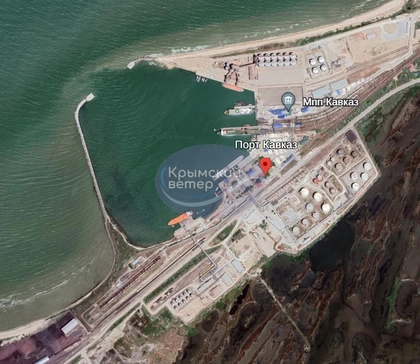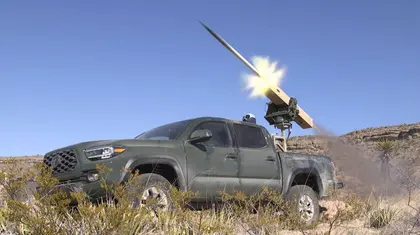A high-tech US-made laser-guided air defense system designed as an economical way to blast massed kamikaze drones out of the sky, and not previously confirmed in operation in Ukraine, shot down an Iranian Shahed-136 drone in skies over the western Odesa region earlier this month, news reports confirmed.
A ground-to-air missile fired by a Ukrainian gunner tracked and hit its target as designed, detonating a proximity fuse and sending a Russian military-launched drone loaded with 50 kg of high explosives spinning to the ground, military video first published by the Ukrainian Navy showed.
JOIN US ON TELEGRAM
Follow our coverage of the war on the @Kyivpost_official.
The footage from the military information platform OSINTechnical showed screen images of a Shahed drone flying at night and targeted by a laser crosshair.
Screen grab of a Russian Shahed drone moments before a laser-guided missile fired by a US-made system hits it. Image of the Feb. 11 engagement published by UNIAN news agency.
An unidentified Ukrainian navy operator tensely tracks the missile’s four second flight from launch and then yells in jubilation at a successful strike: “Come on, baby, come on, come on! [expletive] Yes! [expletive] Yes!”
Footage of Ukrainian naval forces downing a Russian Shahed-131/136 attack drone over Odesa. pic.twitter.com/WzIh4wHN0l
— OSINTtechnical (@Osinttechnical) February 11, 2024
The video shows the Shahed drone abruptly nosing downward and wobbling after getting hit. It was likely the first publicly confirmed use by the Ukrainian military of an American Advanced Precision Kill Weapon System (APKWS) missile, a conversion weapon made by adding precision guidance electronics, control surfaces and laser targeting upgrades to the Hydra 70mm rocket, a widely available unguided air-to-ground weapon initially designed in the Korean War era.

Drones Hit Train Ferry in Russia’s Krasnodar Krai
The Ukrainian Defense Express news magazine citing military sources said the launcher used in the engagement was a newly developed Vampire system manufactured by the US high-tech firm L3Harris. Combining a sensor mast with a launch box containing four missiles, and data links connecting the launcher with the missile, the Vampire was per corporate statements “specifically tailored” for the Ukrainian military as an easy-to-use truck-mountable system for launching guided APKWS missiles.
APKWS guided missile is launched in a test firing from a VAMPIRE system installed on the bed of a Toyota pickup truck. 2022 image from Vampire’s manufacturer, the L3Harris company.
The Vampire launcher is equipped with thermal and infrared sensors, shielded data links, a laser, and television screen allowing an operator to guide the missile by moving a cursor on the screen, that aims the laser at a target. A laser seeker aboard the APKWS flies the missile to the target hit with the laser beam aimed by the operator.
L3Harris received a $40 million Pentagon contract in January 2023 to develop 14 ground-based APKWS launchers to give the Ukrainian army an alternative to expensive, long-range anti-aircraft missiles as way to battle cheap Russian Shahed kamikaze drones. The contract called for four systems to be delivered by mid-2023 and ten more by the end of 2023.
To date, the only confirmed combat use of an APKWS missile outside the US armed forces, and with a Vampire ground launch system by any military, appears according to the Ukraine Navy video to have taken place in early February near Odesa, by an Armed Forces of Ukraine (AFU) air defense unit engaging a Shahed drone launched by the Russian army.
Since early 2023 Russian air strike planners have almost always launched missiles against Ukrainian cities and military targets only when escorted by swarms of Shahed drones, forcing the Armed Forces of Ukraine (AFU) to expend limited numbers of anti-aircraft missiles, some costing four or five times the list factory price of a Shahed, for air defense.
The cost of a single APKWS missile bought by US taxpayers for the Ukrainian military is $40,000, the Ukrainian military information platform Defense Express reported. The cost of an obsolete Hydra rocket, prior to conversion into an APKWS missile, is around $2,300.
CAPTION: Drawing of the APKWS missile. Wikipedia image.
Ukrainian air force spokesman Yuriy Ihnat in a Dec. 21 statement said that since invading Ukraine, Russia had launched at least 3,700 Shahed drones at Ukrainian homes and businesses, of which the AFU shot at least 2,900 down. The Kremlin has acknowledged it has purchased strike drone technology from Tehran but claims it manufactures Shaheds domestically. According to independent observers, a factory in Russian Tartarstan assembles some aircraft from purchased parts and imports other aircraft whole. Estimates of the cost to Russia to import and field those aircraft vary.
According to information originally published by information platform Iranian Cyber News Agency (ICNA), an Iranian Revolutionary Guard Corps front company called Sahara Thunder recently agreed to sell more than one hundred Shahed kamikaze drones to a Russian buyer in Tartarstan for between $190,000 and $290,00 each, depending on final delivery terms.
CAPTION: Image of a contract between a Russian company called Alabuga Machinery and an Iranian import-export company called Sahara Thunder, for the delivery of Dolphin 132 motorboats to Russia in exchange for $125.9 million in gold
The anti-Teheran hacker group Prana network on Feb. 4 claimed it broke into Sahara Thunder corporate computers and downloaded more than 10 Gb of data documenting ongoing deliveries of Shahed attack aircraft by the Revolutionary Guard Corps to Russia. Hackers identified and uploaded to the internet data documenting “contracts of multi-million dollar deals, payments with gold bars, plans for UAVs, details of an agent in UAE called Generation Trading FZE, a company called Alabuga, bank account details, factory layouts,” ICNA report said.
The Russian Federation-registered firm LLC Alabuga Machinery is a company based in Yelabuga Russia. It has been sanctioned by Ukraine as Moscow’s main importer and manufacturer of Iranian attack drones for launch against Ukrainian homes and businesses. The contract published by Prana identifies the Alabuga executive signing the delivery contract as “N.N. Aftapov.” Online Russian corporate registries identify Alabuga’s General Director as “Nikolai Nakipovich Aftapov,” Kyiv Post research found.
The Ukrainian military information platform Militarnyi on Feb. 6 reported that among the stolen data were copies of a February 2023 contract between an Iranian trading company called “Alabuga Mashinari,” and the exporter Sahara Thunder, recording the payment in gold ingots by the Russian Federation for the delivery over 30 months of between 2,000 and 6,000 Iranian-manufactured drones and drone kits.
If those figures are accurate, then the cost to Russian taxpayers to launch a Shahed drone against a Ukrainian target, is between four and seven times greater than the price to US taxpayers to buy an AKPWS missile to try and shoot it down.
According to the Militarnyi report, the contract falsely describes the Tehran-manufactured attack aircraft as “Dolphin 632 motor boats,” as a tactic to evade international watch agency detection of sanctions on Iran and Russia. Other major independent Ukrainian news media reported the Alabuga-Sahara deal appeared to show Iranian manufacturers and middlemen involved in the drone sale to Russia likely were raking in a 300-500 percent profit over the actual $30,000 manufacturing cost of a single Shahed drone.
According to the Ukrainian sanction tracker War and Sanctions, major Kyiv allies like the EU, the US, Japan and Commonwealth countries have sanctioned neither LLC Alabuga nor Aftapov.
You can also highlight the text and press Ctrl + Enter










